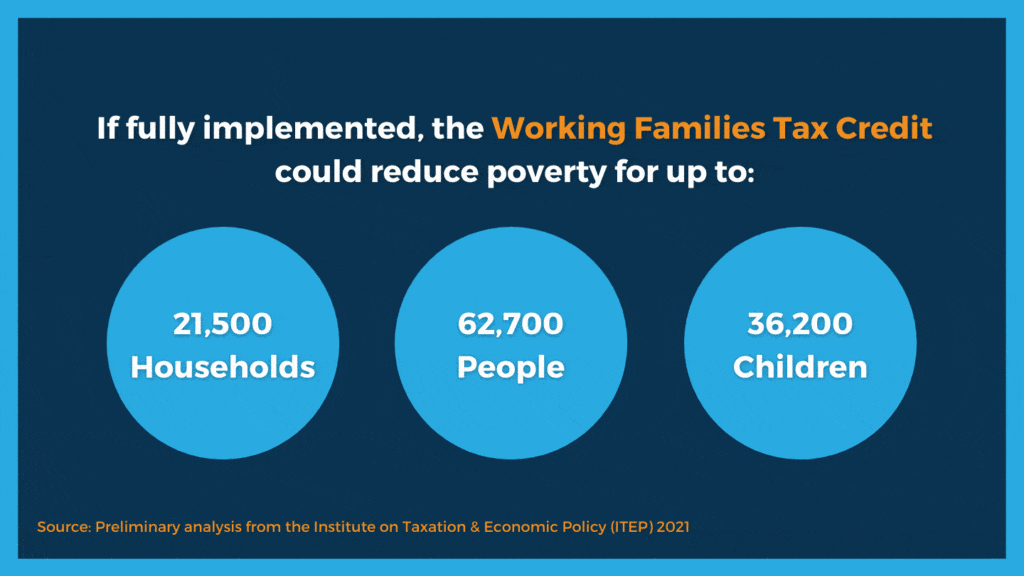During the 2021 legislative session, lawmakers took action to support families and make our tax code more equitable by passing a Working Families Tax Credit. Starting in 2023, more than 400,000 households with low and moderate incomes across the state will get an annual financial boost of up to $300 for a single person and $1,200 for a family of four or more through the credit. And unlike federal tax benefits which exclude immigrant workers and their families, Washington state’s credit will be accessible to people who use an Individual Tax Identification Number, or ITIN, to file taxes in lieu of a social security number.
Researchers, policymakers, and recipients have long known the positive health and economic benefits tax policies like the Working Families Tax Credit can provide. State and federal tax credits targeted to people with low incomes have shown to reduce economic hardship, improve physical and mental health and well-being, and support educational and developmental outcomes for children in families that receive credits. That’s because tax credits reduce financial strain and the corresponding toxic stress that comes with not being able to meet essential needs. And due to the flexible nature of tax refunds, policies like the Working Families Tax Credit give recipients the autonomy to decide for themselves how to best invest in their well-being – unlike many other anti-poverty programs that were designed with harsh barriers and limits based on racist myths about who is and isn’t deserving of public support.
Given the well-documented outcomes of these tax credits, it’s no surprise that Washington state’s Working Families Tax Credit is estimated to have a widespread positive impact and significantly reduce financial hardship across the state. If fully implemented,1 the credit could lower Washington’s poverty rate by up to 0.8 percentage points and reduce the child poverty rate by up to 1.7 percentage points, according to preliminary analysis from the Institute on Taxation and Economic Policy. That would mean up to 21,500 households – or 62,700 people including 36,200 children – could move above the federal poverty level with the Working Families Tax Credit in place.
All in all, the Working Families Tax Credit is an important tool for helping more people and families have resources to meet their needs, but it will take a variety of public policy interventions to ensure more people are able to lead healthy and well lives.
A note about the Federal Poverty Line as a measure of economic hardship:
While a widely-used measure of economic hardship nationally, moving “above the poverty line” does not necessarily mean a household stops experiencing financial strain. The federal poverty definition also obscures significant geographic variation in the costs of living across and within states. In fact, the current federal poverty threshold for a family of two in is $17,420 – much less than what is needed to cover essentials like food, childcare, and housing for a single parent with a young child in many parts of Washington.
Federal tax credit expansions can amplify the impact of the Working Families Tax Credit
Recognizing the value of tax credits, federal policymakers expanded both the Earned Income Tax Credit (after which the Working Families Tax Credit is modeled) and the Child Tax Credit as part of the recently-passed American Rescue Plan.
The expanded Child Tax Credit will provide families with up to $3,600 in tax year 2021 (the maximum was previously $2,000). Unlike in previous years in which the credit was lumped into a family’s regular annual tax refund, families will soon begin receiving half of their Child Tax Credit refund in advance monthly payments for the coming tax year. And under the Rescue Plan, more workers without children will qualify for the Earned Income Tax Credit.
In the short term, these expansions will further help families with and without children invest in their well-being and will significantly reduce the stress of economic strain – but they’re only temporary.
Congress has an opportunity to significantly amplify state tax credits by making these federal policy changes to the Child Tax Credit and Earned Income Tax Credit permanent. Furthermore, Congress should follow the lead of Washington state and five others and make credits fully available to ITIN filers and mixed immigration status families. It took a pandemic to secure long-needed – but temporary – expansions. Policymakers shouldn’t wait until another disaster to make these commonsense policies more inclusive and permanent.
The Working Families Tax Credit and federal tax credit expansions will make a meaningful difference for hundreds of thousands of households across the state. But we know it will take more than a single type of policy to make Washington a state in which everyone can live with dignity and thrive. Paired with other cash assistance policies and broader economic interventions that reduce inequality, inclusive targeted tax credits are an important part of the path toward economic justice.
You may be eligible to claim the Child Tax Credit, even if you did not need to file a federal tax return. Update your information through the IRS Child Tax Credit filer website portal. To learn more, visit childtaxcredit.gov.

